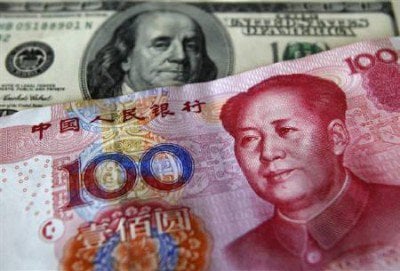Foreign Cash Flow into Russia to Hit Record Despite Sanctions

All Global Research articles can be read in 51 languages by activating the “Translate Website” drop down menu on the top banner of our home page (Desktop version).
To receive Global Research’s Daily Newsletter (selected articles), click here.
Visit and follow us on Instagram, Twitter and Facebook. Feel free to repost and share widely Global Research articles.
***
The Institute of International Finance believes that Russia’s current account surplus is likely to reach $200-240 billion this year. Experts note that Moscow’s balance of payments has historically been determined by the export of energy resources, raw materials and import of goods. Considering the price levels, especially for oil, Russia’s revenue from oil sales in March reached historic highs, something that was not expected when the West launched its economic war against Moscow. None-the-less, it appears that the yuan, China’s currency, will be the biggest winner during this crisis between Russia and the West.
Banks are now asking customers to open accounts in China’s national currency and this trend is being observed not only in Russia, but across the world. As early as 2019, Moscow and Beijing adopted the decision to gradually abandon the dollar in trading with each other. But, at the time, these were just the intentions and the first step: overall, Chinese banks still have large reserves of American dollars.
Now, China’s Foreign Ministry has raised the topic of switching to payments with Russia to the ruble or yuan. Discussions about transferring payments in the national currency of energy commodities are already underway. Beijing is pushing for a similar strategy in Southeast Asia and in its dealings with Arab countries. For example, Saudi Arabia is unhappy with Washington’s policies and calls the dollar a black hole. As a result, Riyadh and Beijing could change the payment currency of oil from dollars to yuan
Ten years ago, China began promoting the use of the yuan internationally and has achieved some limited success. It is recalled that Federal Reserve Chairman Jerome Powell said that events in Ukraine could change China’s financial trajectory and that Beijing can take advantage of the situation and start expanding the yuan.
According to the IMF, the yuan is the fifth largest reserve currency in the world, with central banks holding the equivalent of about $319 billion in reserves. Within the global economy, this figure is not so large: the yuan accounts for only about 2.5% of the total reserves of central banks. By comparison, the dollar accounts for more than 50% of reserves and the euro 19%. At the beginning of the year, Bloomberg reported that the Chinese currency had become the fourth most popular means of payment in the world.
Currently the yuan is used as a reserve currency in about 75 countries. The yuan could become the new international currency because China has a strong economy and the country produces everything from simple goods to high tech weapons.
In effect, it is Western policies that led Russia to expand trade with the East. For example, India and Russia are discussing the creation of a payment mechanism in rubles and rupees.
One way or another, Russia-China bilateral trade will quickly grow under the current circumstances. China has one of the largest reserves of rubles, with the Russian currency accounting for 13.8% of its foreign exchange reserves. In addition, China is Russia’s main trading partner, with the volume of transactions between the two countries exceeding $148 billion last year.
However, on a number of important issues – for example, the supply of parts for aircraft, Beijing has so far not adopted a specific decision. According to Reuters, China has reportedly recommended that its four largest oil and gas companies reduce their participation in Russian projects. China’s Foreign Ministry denied the report.
Although experts say the reason the yuan is so unpopular in international trade is because the Chinese government does not have a positive global image, this ignores the fact that China’s multilateralization and diversification of economic relations are still underdeveloped. In this way, so long as China’s economy goes strength to strength, the Russian economy and ruble will be able to weather the full effects of the West’s economic siege, something that was unlikely anticipated when sanctions were enthusiastically imposed.
For a long time, the maintenance of a cheap national currency was beneficial to Beijing thanks to the large volume of exports of goods valued in US dollars. However, the role of the Chinese currency in foreign trade with Russia will depend on its will and most importantly on Beijing’s ability to operate independently and autonomously from the West. Both Russia and China appear to be on the correct and accelerated path towards de-Dollarization.
*
Note to readers: Please click the share buttons above or below. Follow us on Instagram, Twitter and Facebook. Feel free to repost and share widely Global Research articles.
Paul Antonopoulos is an independent geopolitical analyst.

